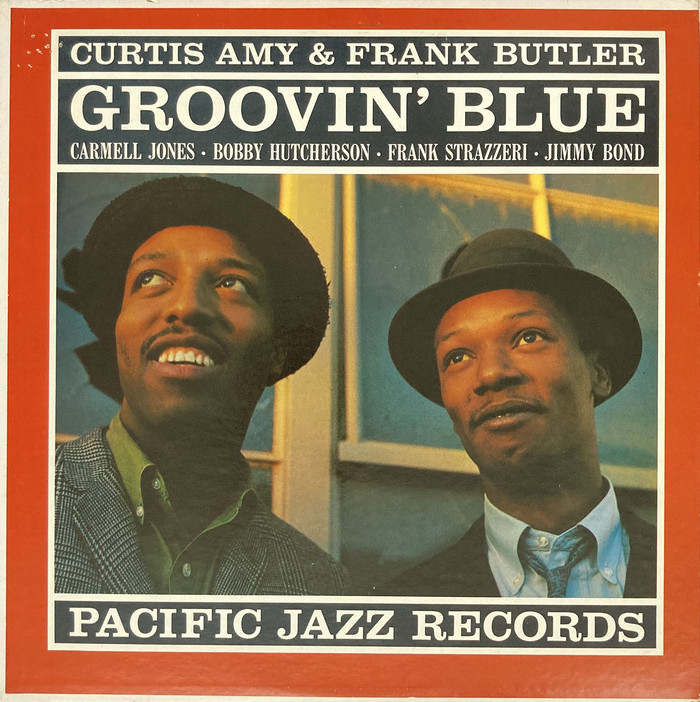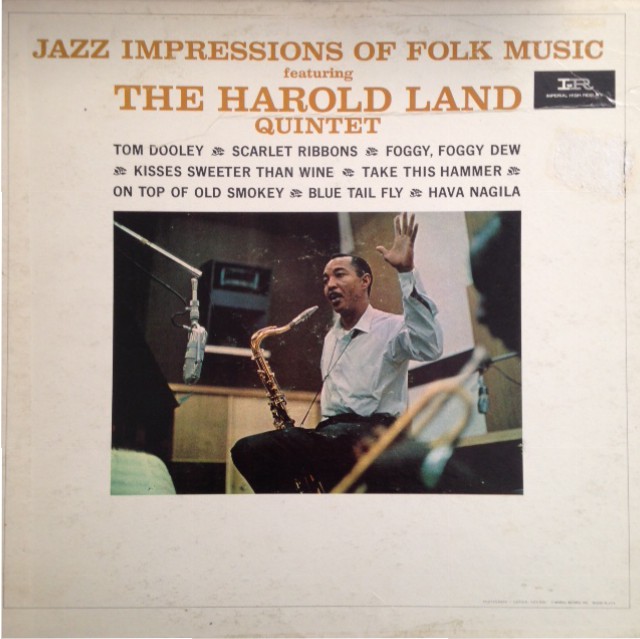While writer Charles Bukowski played the piano drunk as a percussion instrument until his fingers began to bleed a bit in East Hollywood, two hardboiled jazz men blew the roof of a studio a mile or so further down the boulevards of broken dreams.
Personnel
Curtis Amy (tenor saxophone), Carmell Jones (trumpet), Bobby Hutcherson (vibraphone), Frank Strazzeri (piano), Jimmy Bond (bass), Frank Butler (drums)
Recorded
on December 10, 1960 at Pacific Jazz Studio, Los Angeles
Released
as PJ-19 in 1961
Track listing
Side A:
Gone Into It
Annsome
Bobblin’
Side B:
Groovin’ Blue
Beautiful You
Very Frank
It isn’t all light-footed and laid-back jazz what the clock struck on the West Coast. Yes, there was a sunny and breezy and carefully pre-cooked Californian phenomenon that came to be known as West Coast Jazz. But there had been similar tightly arranged chamber jazz endeavors on the East Coast. And hadn’t Los Angeles itself churned out its share of groove and grease normally associated with the Mid-West and East? Les McCann was an incredibly popular Calif-based gospel-infused burner. A lesser-known hard swinger is tenor saxophonist Curtis Amy.
As a matter of fact, strictly defined, the Houston, Texas-born Amy (1925) is West nor East but a Texas tenor-inspired blower. His is a style that punches faces with strong fists and tattooed knuckles. His sound is solid and meaty, like a spicy stew of chili beans and pork ribs. He’s a modern cat that is drenched in blues and the booming licks of the likes of Illinois Jacquet. Lone Star swagger.
Intermittently residing in Tennessee, Amy reached Los Angeles in the late 1950’s. He recorded for Pacific Jazz, a strong series of records that featured organist Paul Bryant, valve trombonist Roy Brewster, bassist Clarence Jones, drummer Johnny Miller, pianist Victor Feldman and vibraphonists Bobby Hutcherson and Roy Ayers. When the name of unsung hero Amy crops up nowadays, it’s usually through Katanga, Amy’s hard bop gem from 1963 that was generally neglected during his lifetime but enjoyed a high-profile Tone Poet reissue in 2021. Katanga featured the enigmatic and brilliant trumpeter Dupree Bolton.
His mate on Groovin’ Blue is drummer Frank Butler. The Kansas, Missouri-born Butler also was not of the ‘lite’ variety but a heavy calorie modernist and drummer of choice for Curtis Counce, Art Pepper, Hampton Hawes and Elmo Hope. Anybody familiar with Harold Land’s furious The Fox knows what unsung hero #2, Frank Butler, is about.
They are groovin’ blue with trumpeter Carmell Jones, vibraphonist Bobby Hutcherson, pianist Frank Strazzeri and bassist Jimmy Bond. Groovin’ Blue flows nice ‘n’ easy and gritty ‘n’ greasy and fast ‘n’ furious from start to finish, the start being Amy’s blues swinger par excellence Gone Into It, the finish consisting of the tenorist’s Very Frank, a boppish explosion that builds on a Frank Butler drum intermezzo.
This set of Amy tunes includes the mid-tempo blues groove of Groovin’ Blue, which is right up the alley of Curtis Amy, a sort of Stanley Turrentine with a harder and more edgy sound if you will. Butler is a propulsive and sizzling force and graces Annsome with a short but sweet solo, all meaningful simplicity and built on a march figure, as if he’s a drummer kid in the second line. Everything he plays is sassy and oozes fun. Beautiful You is a ballad that revolves around a story by Bobby Hutcherson, which certainly deserves the adjective of beautiful. The most original tune is Bobbin’ and juxtaposes waltz with 4/4 groove and features fine solo’s by Jones, Amy, Hutcherson and Strazzeri.
That’s tenor, trumpet, vibes and piano, which makes up for a sparkling sound palette, one more reason to get Groovin’ Blue while you can.





